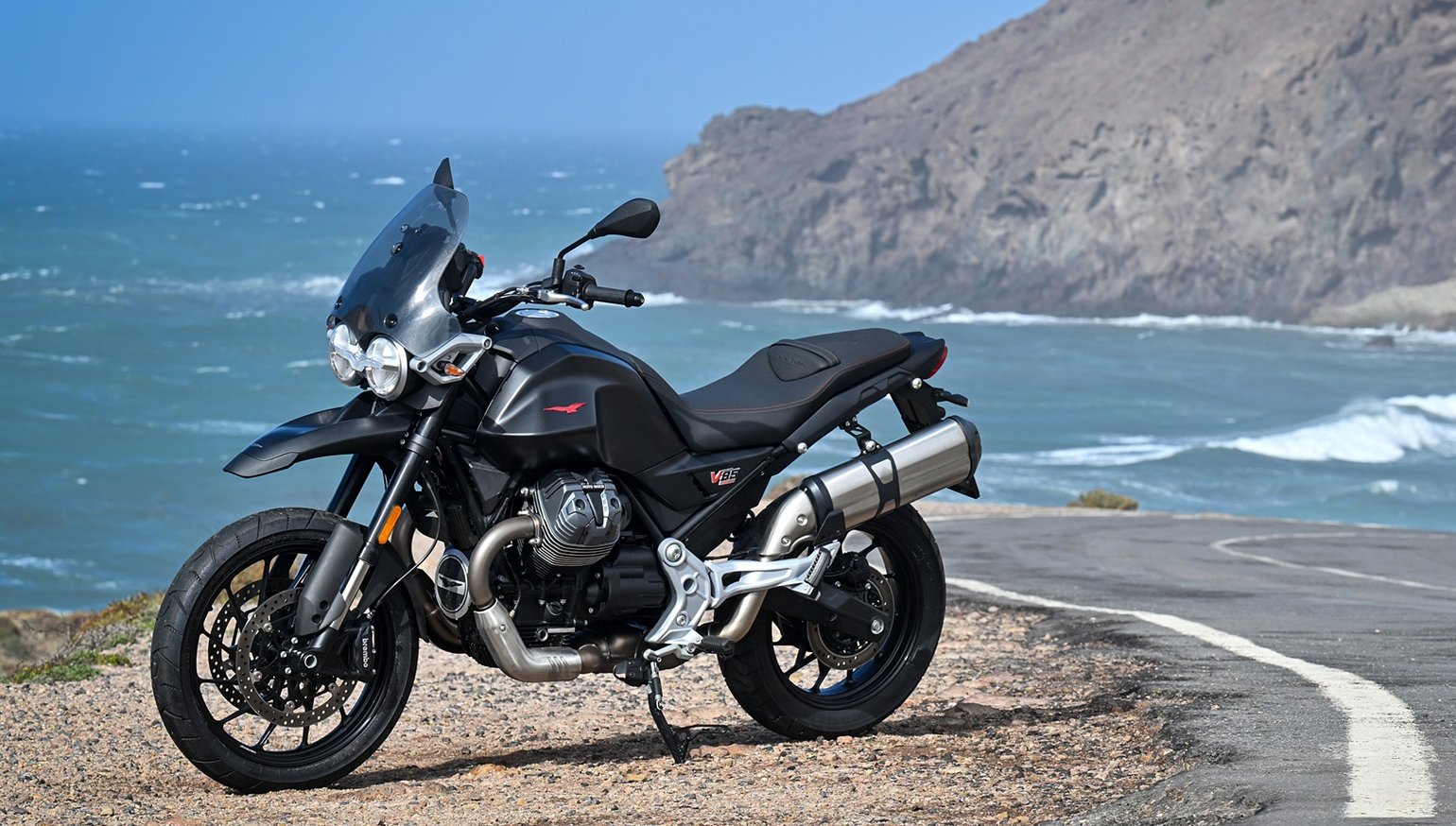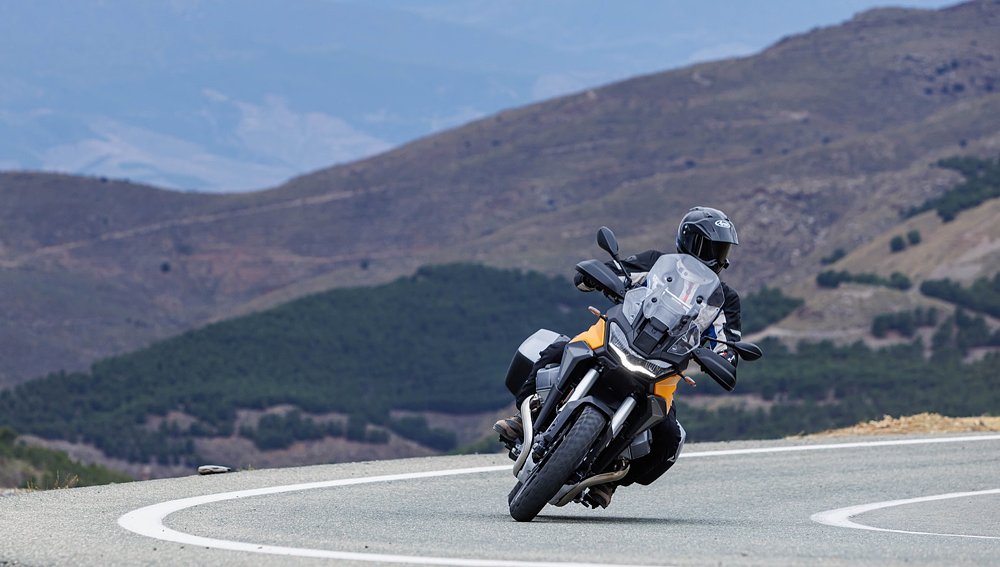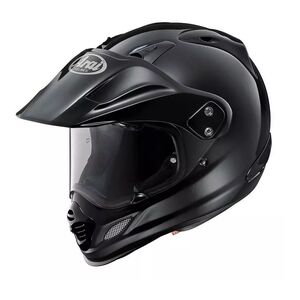With the positive reception given to the new liquid-cooled "compact block" engine in the Moto Guzzi V100 Mandello and Stelvio, the more traditional segments of Moto Guzzi's customer base might understandably worry that the air-and-oil-cooled "small block" V-twin could be neglected, or even phased out. Not so. Instead, Moto Guzzi is updating it.
Moto Guzzi is not only adding variable valve timing to the 853 cc "small block" engine in the V85 adventure-tourer, but it's also expanding the line with a third V85 model for 2024. More choices, not fewer.
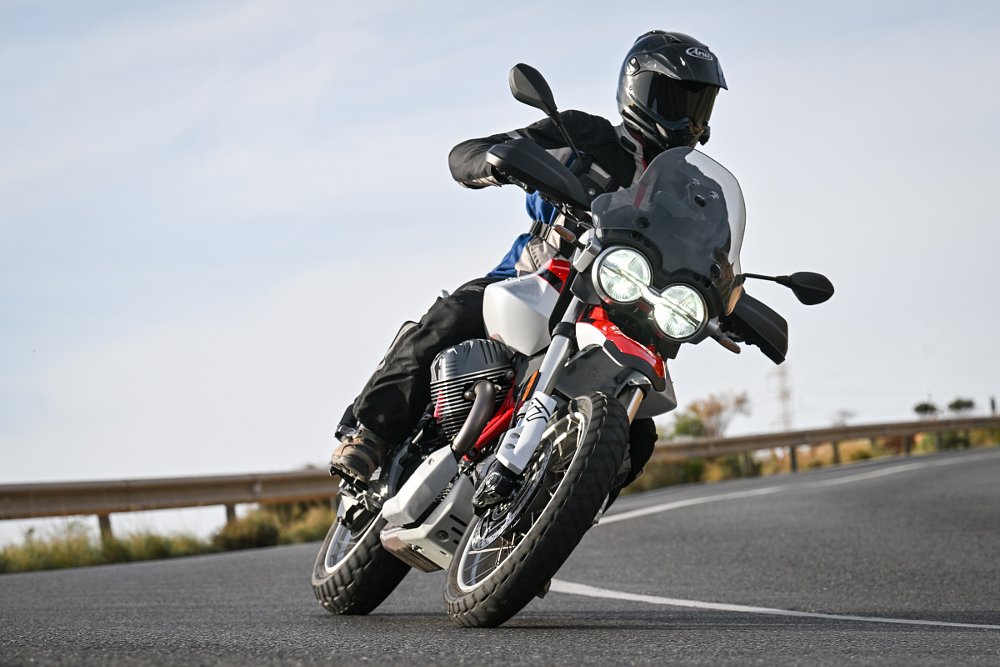
A splash of tech with your traditional V-twin
"The challenge," says Moto Guzzi Head of Engineering Piero Soatti, "was to improve the V85 without changing the character of the motorcycle."
In terms of most measurements, the engine remains the same. It's still the traditional air-and-oil-cooled V-twin with two valves per cylinder and shaft final drive connecting through a dry clutch that is Moto Guzzi's signature. But variable valve timing, knock sensors and a third lambda sensor in the exhaust have been added to achieve dual goals of improving performance and meeting Euro5+ emissions standards. Moto Guzzi says these changes yielded an increase of peak power from 76 horsepower at 7,500 rpm to 80 horsepower at 7,750 rpm. Peak torque stays about the same at 61 foot-pounds, but 90% of it is available at just 3,500 rpm and there's an impressive bump of 5% to 10% in torque between 3,000 and 4,500 rpm, compared to the previous model.
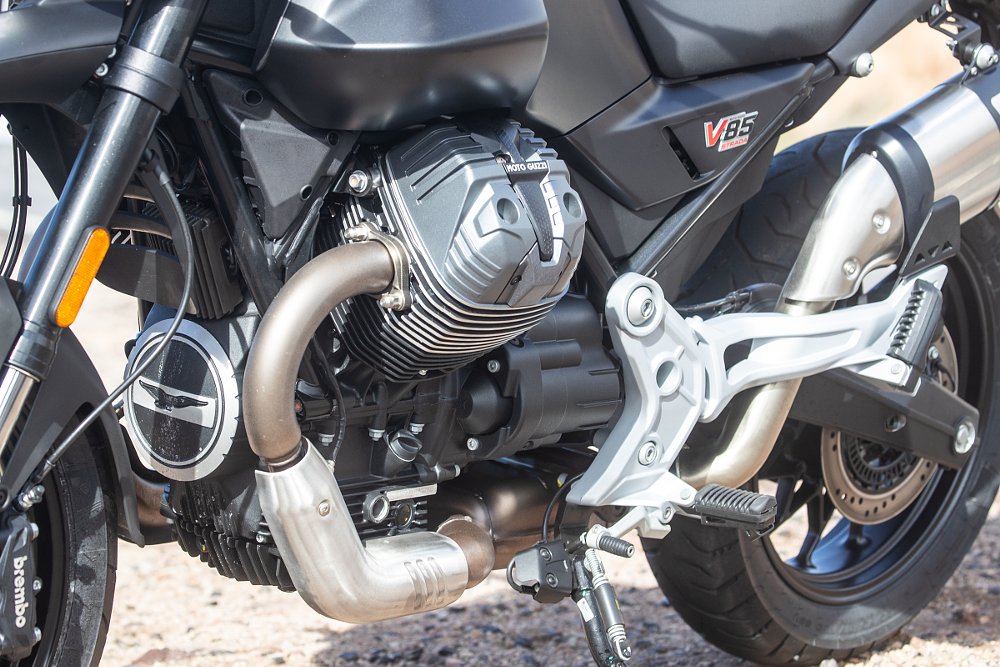
The new V85s get an appearance update that Moto Guzzi calls "an evolution of the original concept." The 2024 models retain distinctive styling elements from the previous V85s, such as the jet fighter-inspired taillights and the headlights with the eagle-wing daytime running light, but the bodywork has been revised for a fresh look and improvements to the aerodynamics.
The real difference, in addition to variable valve timing in the engine, is the expansion of the line.
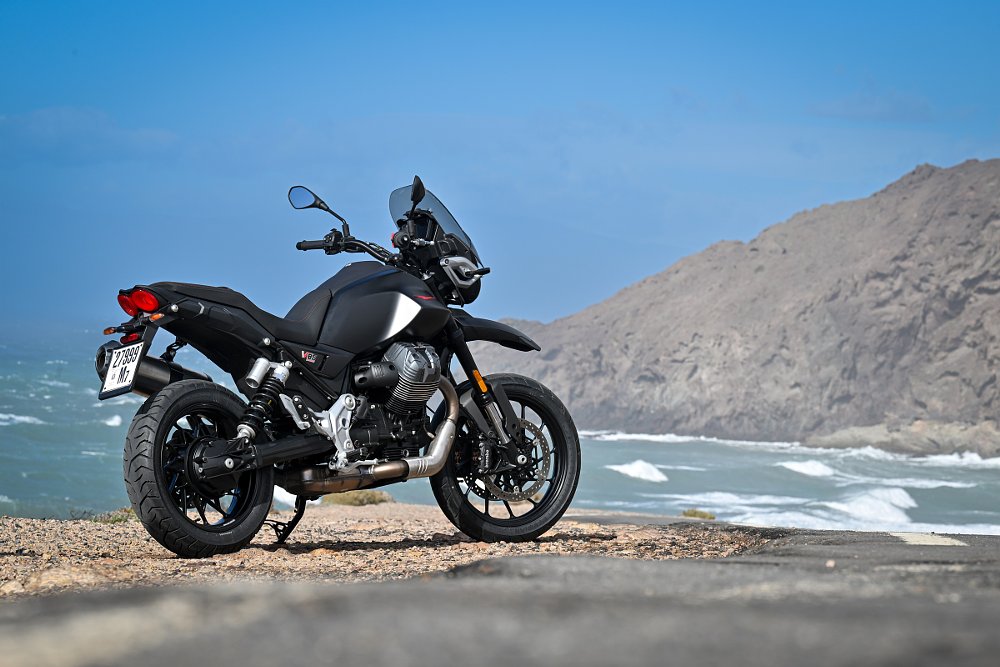
Three flavors of V85
The V85 was unveiled as a concept at the EICMA show in 2017 and joined the Moto Guzzi lineup in 2019 as the V85TT. (Some Common Tread writers were enthusiastic even before riding it.) The V85TT Travel, equipped for touring, was added in 2020. Now, in 2024, a new model joins the lineup, aimed at those who do most of their riding on pavement: the V85 Strada. The Strada slots in as the least expensive and lightest V85, and much of the weight savings comes from the cast aluminum wheels instead of the spoked steel wheels that allow tubeless tires on the more off-road-ready V85TTs.
The Strada also forgoes a little of the tech found on the other two models. It comes with three riding modes (Sport, Road, Rain) compared to four on the V85TT and five on the V85TT Travel. While the Strada comes with ABS and traction control, the two TT models add an IMU that powers cornering-sensitive ABS and traction control.
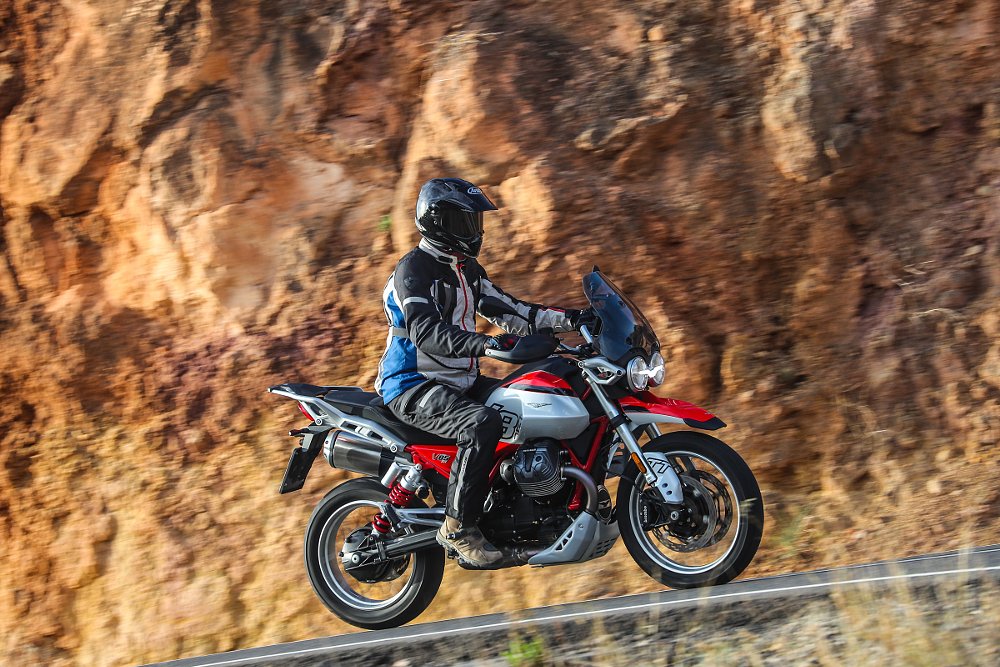
The two V85TT models have an Off-Road ride mode that minimizes traction control intervention and disables ABS on the rear wheel by default. You can manually disable ABS on the front wheel, as well. It also smooths out throttle response and increases engine braking. The V85TT Travel adds a fifth ride mode that is customizable by the rider.
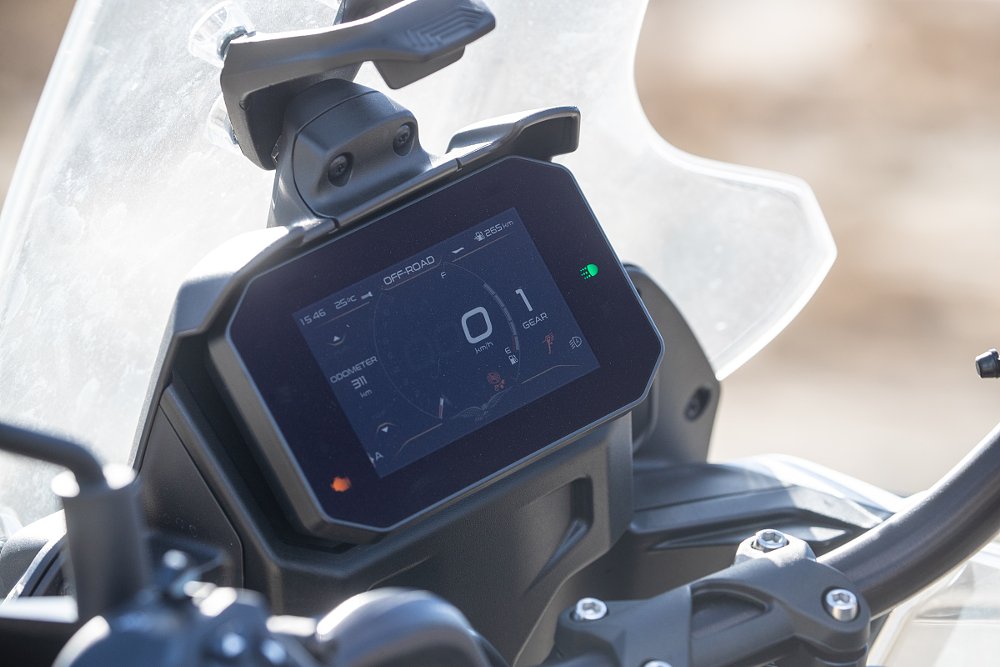
All three models come with cruise control, a new five-inch TFT display, and a USB outlet. The V85TT adds an aluminum skid plate and handguards, in addition to the different wheels. Beyond that, the V85TT Travel adds a larger, manually adjustable (2.75 inches of range) windscreen, wind deflectors, heated grips, a heated rider seat, Moto Guzzi's MIA phone pairing system, and Urban panniers with 37 liters of capacity on the right (enough for a helmet) and 27.5 liters on the left. With the fuel tank holding a shade over six gallons on all three models, range should live up to the Travel name, even if you get the Strada.
The one important question that's still unanswered is the price. Moto Guzzi has not yet set an MSRP for the V85 models in the United States. Based on the prices announced for the U.K. market, the V85s will start in the low to mid five figures, with the Strada being the least expensive. Even the V85TT Travel should slot in significantly below the $16,390 Stelvio, which is more powerful and has additional features, but the question is how much lower.
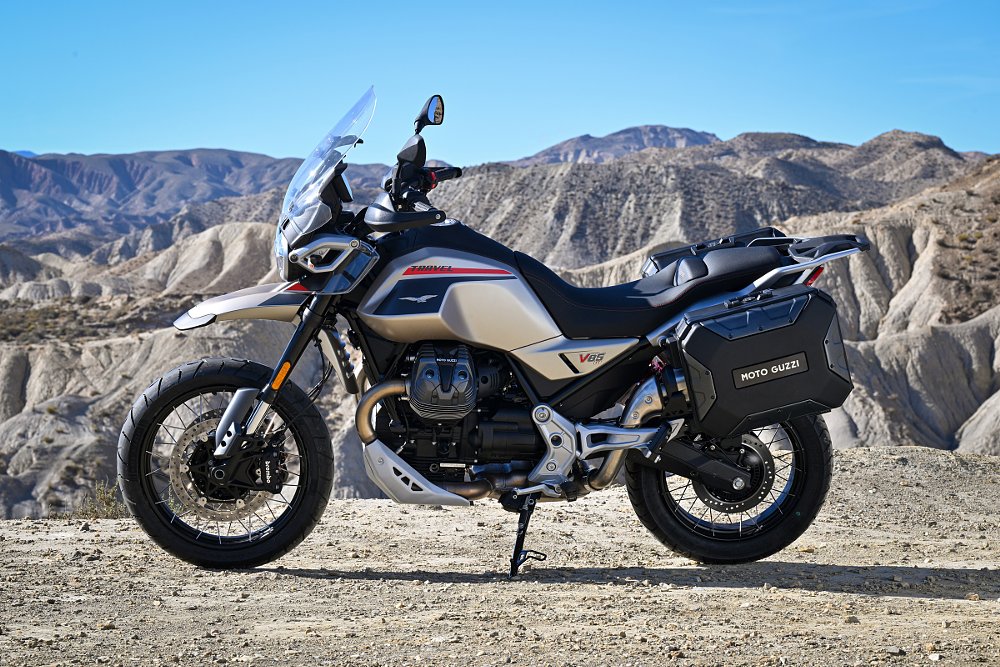
Riding the V85 Strada, V85TT, and V85TT Travel
When I went to Spain to ride the Stelvio, I also got a chance to ride the V85 models. I only had 75 miles to sample all three, but I came away with some pleasant surprises.
Years ago, I had the pleasure of taking the previous generation V85 on a road trip from Los Angeles, California, to Austin, Texas, and back, and during that ride I found the bike to be comfortable, capable, and fun. It also vibrated so much that by end of the journey, the camera on my handlebar-mounted phone no longer worked.
The new bike offers a recognizably similar experience but with incremental improvements. When you offer the only mid-sized adventure bike with a rotated (no, I won't call it transverse, as Moto Guzzi does) V-twin with shaft drive, you're automatically going to be appealing to a specific niche of customers.
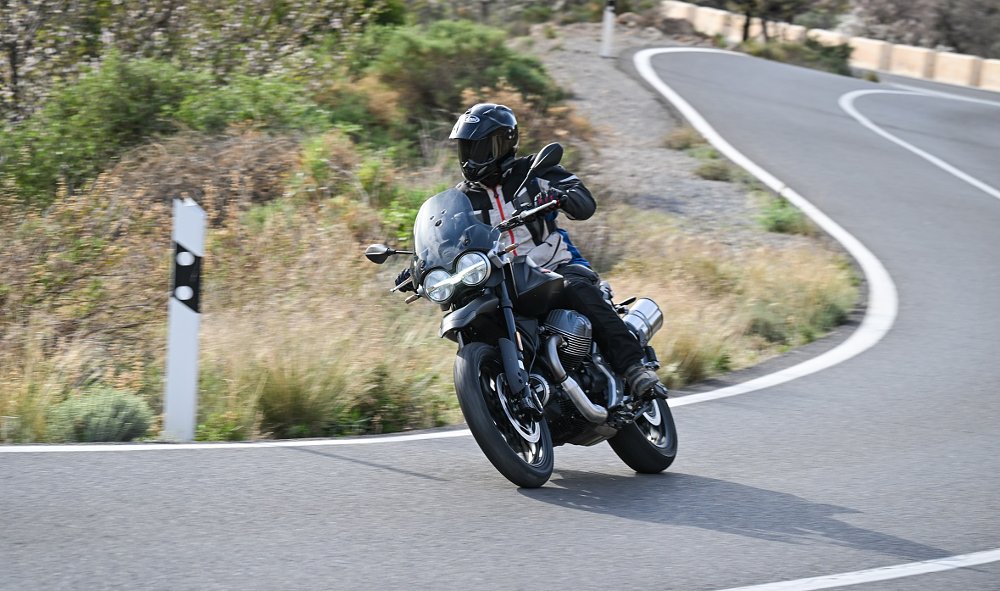
While I spent most of my time on the V85TT, the Strada was the surprise of the trio and the bike I would likely purchase for myself, among the three. It could be easy to assume that the Strada is just a cheaper version built to a price to try to lure in more customers. But it truly serves a distinct purpose in the lineup because it's the best option for riders who don't have any interest in leaving the pavement.
When I hopped on the Strada, my first impression was that the 32.7-inch seat height makes the bike quite approachable. The scalloped seat and revised tank shape make you feel like you're in the V85, not on it. Moto Guzzis of yesteryear have a reputation for shaking side to side due to the engine orientation when you fire them up or give them some go juice and the new V85 is no different. I find this charming, but that's definitely a personal preference.
There's a distinct difference between the ride modes, but at the end of the day, 80 horsepower and around 500 pounds of weight isn't going to blow your skirt up. That's not with the V85 is about. It rewards smooth riding and a leisurely attitude, like Guzzis before it.
The main difference from an engine standpoint is what VVT brings to the table. Guzzi engineers were able to tune the low end for better torque, knowing that they could adjust the camshaft for more top end as needed. I'm sure that I'd feel a small difference if I rode the old and new bikes back to back, but I'd still describe the new motor as a bit more than adequate.
I could feel the change from the VVT at around 6,500 rpm. And then I'd hit the redline at 8,000 rpm. That made it hard to enjoy the increased top end, and even though there's more a kick before redline, this is still a motor that's best enjoyed between 4,000 and 5,500 rpm. The extra top end provided by the VVT does help in situations where you're in third or fourth gear and making a pass on the highway, and if you do hit redline it's a very gentle cutoff. But I would be highly surprised if most riders feel the benefits of VVT in their everyday riding. Moto Guzzi had to incorporate the variable valve timing for emissions reasons, but it's not a radical change in the riding experience.
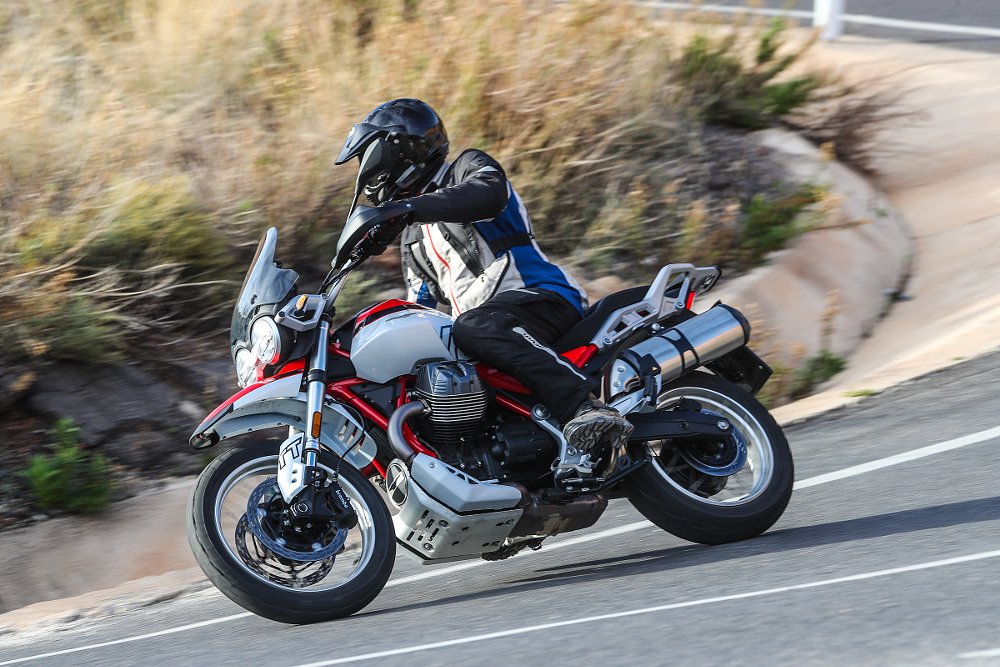
The transmission is fine but a bit clunky, and everyone around you will hear when you shift. Guzzi does not offer a quickshifter for the V85 and I never found myself wanting one, considering the relaxed nature of the bike.
Whether you're in the rider or passenger seat, the V85's ergonomics are surprisingly comfortable, though the heel of my left boot hits the side stand, so I have to either splay my foot out or move it too far forward. My right foot occasionally hit the passenger peg mount, but I was wearing bulky ADV boots, so I don't think that will be a problem for most people. The vibrations have stuck around from the old bike. I found they peaked around 5,500 rpm, sending a moderate buzz through the hand grips and rendering the mirrors close to useless. I also wish those mirrors were bigger.
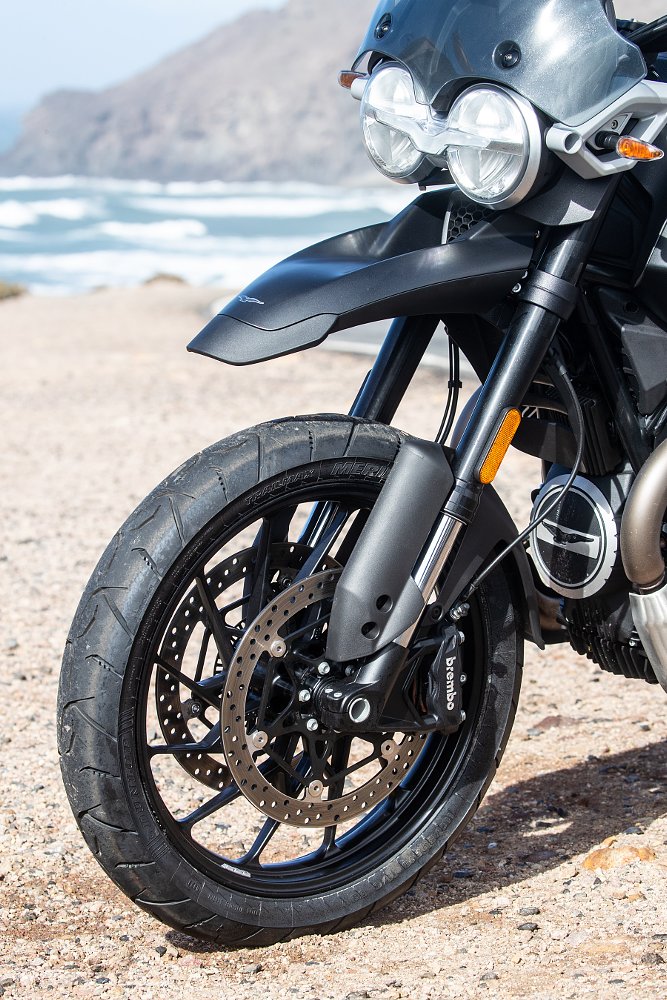
The shock is up to the task but an Öhlins upgrade is available from the factory. The TT and the Travel have remote preload adjustment but you're going to have to go old school with a C-spanner if you want to make adjustments on the Strada. Suspension travel is 6.7 inches front and rear, and there’s 8.27 inches of ground clearance.
Those numbers won't be too relevant if you don't plan to go off-road, and if that's the case then the Strada is the way to go. The main advantage of the Strada model is the wheelset. The cast aluminum wheels, 19-inch front and 17-inch rear, shave approximately eight pounds of unsprung weight and it's easy to feel the difference. The Strada is significantly more nimble than its siblings and after I spent a little bit of time on it, I wished I had spent the whole day on it. It's my favorite of the lineup to ride, though I think it's let down a bit by the bland aesthetics.
We didn't cover any dirt on our ride, but off pavement, the TT would be the way to go. The spoked wheels will help when the road isn't perfect and the Michelin Anakee tires on the TT are a bit more dirt-oriented than the Dunlops on the other two models, but if you're planning to do any serious off-roading the V85 probably isn't the right bike for you, anyway. The V85TT's handling on pavement is still predictable and enjoyable, but it just takes more effort to get the bike to go where you want it to.
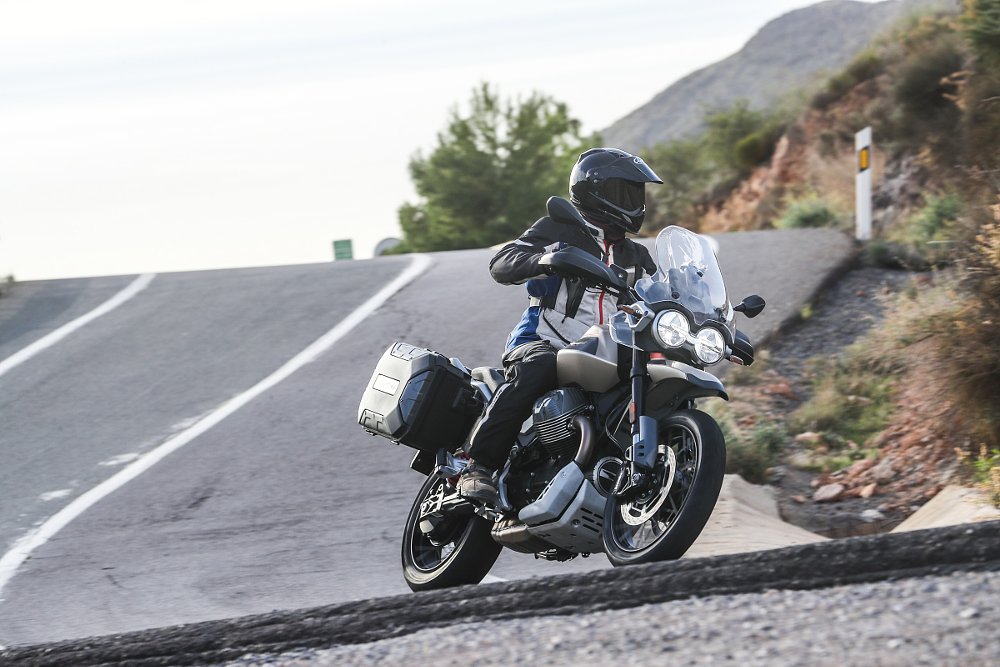
Riding the Travel model is a similar experience to the TT, though you definitely feel the weight of the luggage in corners. The most noticeable difference with the Travel is the wind protection. Its larger touring windscreen is taller and offers 22% more surface area. The Travel also comes with new air deflectors alongside the windscreen and Moto Guzzi states that air pressure on a rider's helmet is reduced by 50% compared to the TT. Based on my limited experience I would agree with that. I'm six feet, three inches tall, and I found that when the stock windshield was at its lowest setting, wind hit the middle of the visor on my Arai XD-4 helmet. With the windshield is at its highest setting, the wind was sent to the helmet's beak. I preferred the low position, but that's usually my personal preference.
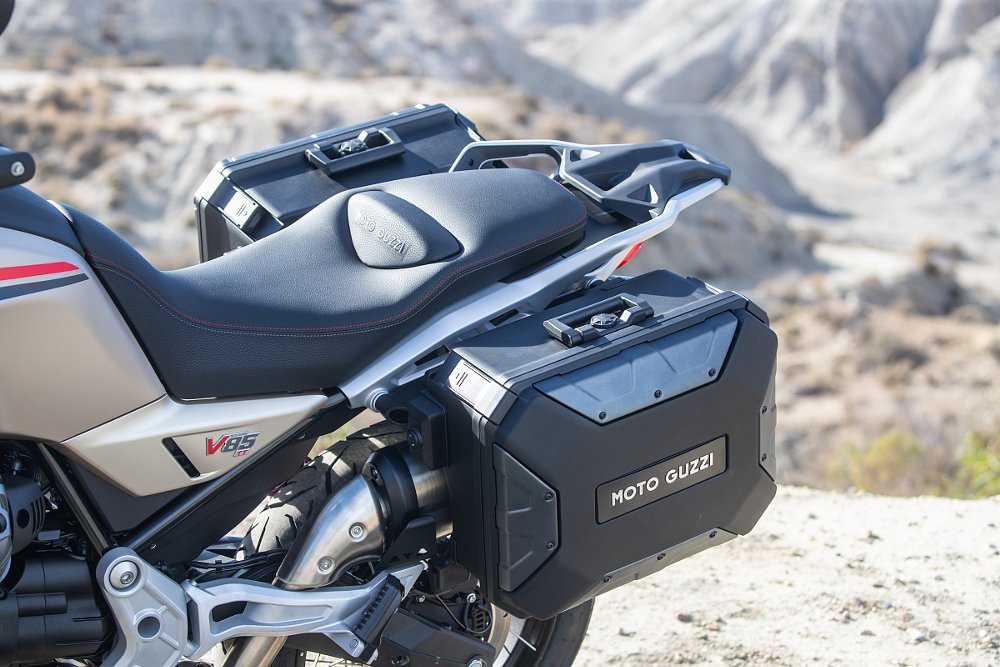
Final word on the V85
Moto Guzzi identifes the BMW F 800 GS, Triumph Tiger 850 Sport, and Tiger 900 GT as competitors to the V85. (It seems like the Suzuki V-Strom 800DE should be on the list, too.) To varying degrees, those other models provide more power, and they definitely all provide a different engine feel. None of them match the Guzzi's shaft drive. Even before you ride them, you probably already have a definite lean toward one experience or the other.
Overall, the V85 continues to be a solid niche bike but the addition of the Strada is a great call on Moto Guzzi's part to broaden the appeal of the model, improve street performance, and target riders who can be honest with themselves about never leaving pavement.
If you're willing to pay a little more and add a few pounds, you could also get the Stelvio, with 35 more horsepower and a more modern riding experience. But maybe you're that traditional customer who wants cylinders to be air-cooled and exhaust pipes to exit from the front, not the sides, of those cylinders. If that's the case, you don't have to worry about the traditional Guzzi small block fading away just yet.
|
2024 Moto Guzzi V85 Strada |
2024 Moto Guzzi V85 TT |
2024 Moto Guzzi V85 TT Travel |
|
|---|---|---|---|
| Price (MSRP) | TBA | ||
| Engine | 853 cc, air-cooled, four-valve, transverse 90-degree V-twin | ||
|
Transmission, final drive |
Six-speed, shaft | ||
| Claimed horsepower | 79 @ 7,750 rpm | ||
| Claimed torque | 61 foot-pounds @ 5,100 rpm | ||
| Frame | Tubular steel | ||
| Front suspension | 41 mm inverted fork, adjustable for preload and rebound damping; 6.7 inches of travel | ||
| Rear suspension | Single shock, adjustable for preload and rebound damping; 6.7 inches of travel | ||
| Front brake | Dual Brembo four-piston calipers, 320 mm discs with ABS | ||
| Rear brake | Two-piston caliper, 260 mm disc with ABS | ||
| Rake, trail | 25.7 degrees, 5.0 inches (128 mm) | ||
| Wheelbase | 60.2 inches (1,530 mm) | ||
| Seat height | 32.7 inches (832 mm) | ||
| Fuel capacity | Six gallons | ||
| Tires | Dunlop Trailmax, 110/80R19 front, 150/70R17 rear | Michelin Anakee, 110/80R19 front, 150/70R17 rear | Dunlop Trailmax, 110/80R19 front, 150/70R17 rear |
| Claimed wet weight |
498 pounds (226 kilograms) |
507 pounds (230 kilograms) |
536 pounds (243 kilograms) |
| Available | Q2 2024 | ||
| Warranty | 24 months | ||
| More info | motoguzzi.com | ||




